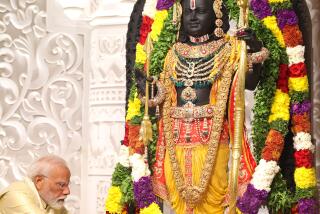A Momentum Toward Freedom : India’s Rao aims to junk state socialism and go to market
- Share via
When India’s Prime Minister P. V. Narasimha Rao took office last June, few could have predicted that this old-fashioned politician would abandon more than four decades of socialist protectionism in favor of a more market-oriented economy.
Rao’s reforms received a much-needed vote of confidence in Parliament last month. But the effort to reorganize the economy could still face stiff opposition from the Indian people in the coming months as inefficient state-owned industries are dismantled and traditionally protected jobs are eliminated.
A key element of Rao’s changes is luring foreign investment to spur the flagging Indian economy, which until recently was a bureaucratic nightmare for outsiders. Rules instituted last summer allow foreigners to acquire a controlling interest in Indian companies and secure automatic licensing approval to operate in many industries that used to be strictly off-limits.
The result: Since last summer India has approved more than $100 million in foreign investment from companies such as IBM, Du Pont and General Electric.
Rao’s finance minister, Manmohan Singh, has tried to further stimulate growth by reducing import tariffs, opening the rupee to currency market forces, allowing foreigners to invest in the Indian stock market and legalizing gold imports.
Given India’s history, any economic change is remarkable. Since independence in 1947, India has maintained an economic policy based on principles of socialist government control that emphasized economic self-reliance.
Rao’s new economic order is all the more improbable considering that last year the country teetered on the edge of chaos after the assassination of Rajiv Gandhi amid the most violent elections in the country’s history.
Economic progress is the only path to prosperity and unity in India, a complex nation of 844 million people, long divided by religious violence, caste tension and separatist ambitions. If the people develop as much confidence in Rao’s reforms as overseas investors seem to have, India might just develop an economy worthy of the world’s largest democracy.
More to Read
Sign up for Essential California
The most important California stories and recommendations in your inbox every morning.
You may occasionally receive promotional content from the Los Angeles Times.













